Human Rights Day - South Africa | Pass Laws in South Africa and the Sharpeville Massacre
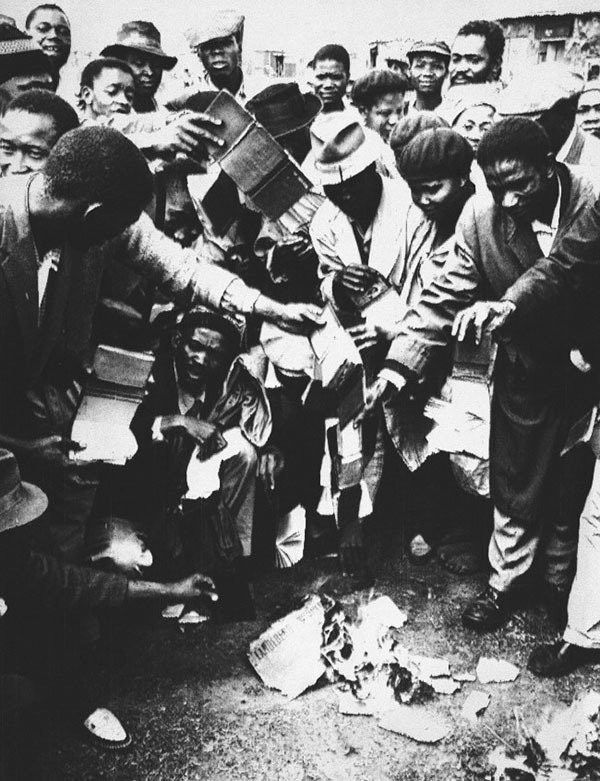
People burning pass books during apartheid South Africa
The carrying of passes in South Africa by Slaves and Black South Africans had a long and oppressive history even before the years of apartheid. Slaves at the Cape were required to carry passes as early as 1709, these 'permission documents' allowed them to leave the farms they were working on. In 1828, ordinance 50 was published, freeing the khoikhoi of having to carry passes and putting them on equal footing with their white employers.
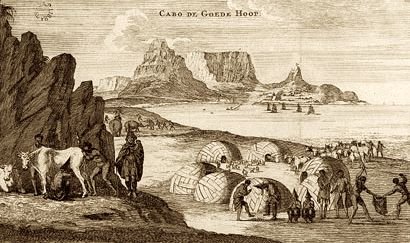
Khoisan at the Cape
British settlers also made use of passes to control vagrancy within the British settlement. British authorities wanted to keep the group of more than 4000 settlers together and implemented pass laws in May 1820. The settlers could not move from one town to another without a pass approved by the local authorities or the governor, because of these restrictions more than 60% of the settlers moved to other parts of the country.
In the Boer Republic of the Orange Free State, the first independent Voortrekker state, Black and Coloured people were forced to carry passes. Initially, the Basotho, the Baralong and other black groups lived in harmony with the Voortrekkers. By the year 1880 the population started to grow significantly and although most of the population was rural, many moved to the towns in search of better employment opportunities. In an attempt to dissuade black and coloured people from moving to the towns, vagrancy laws was passed by the local and national government forcing Blacks and Coloureds to carry passes.
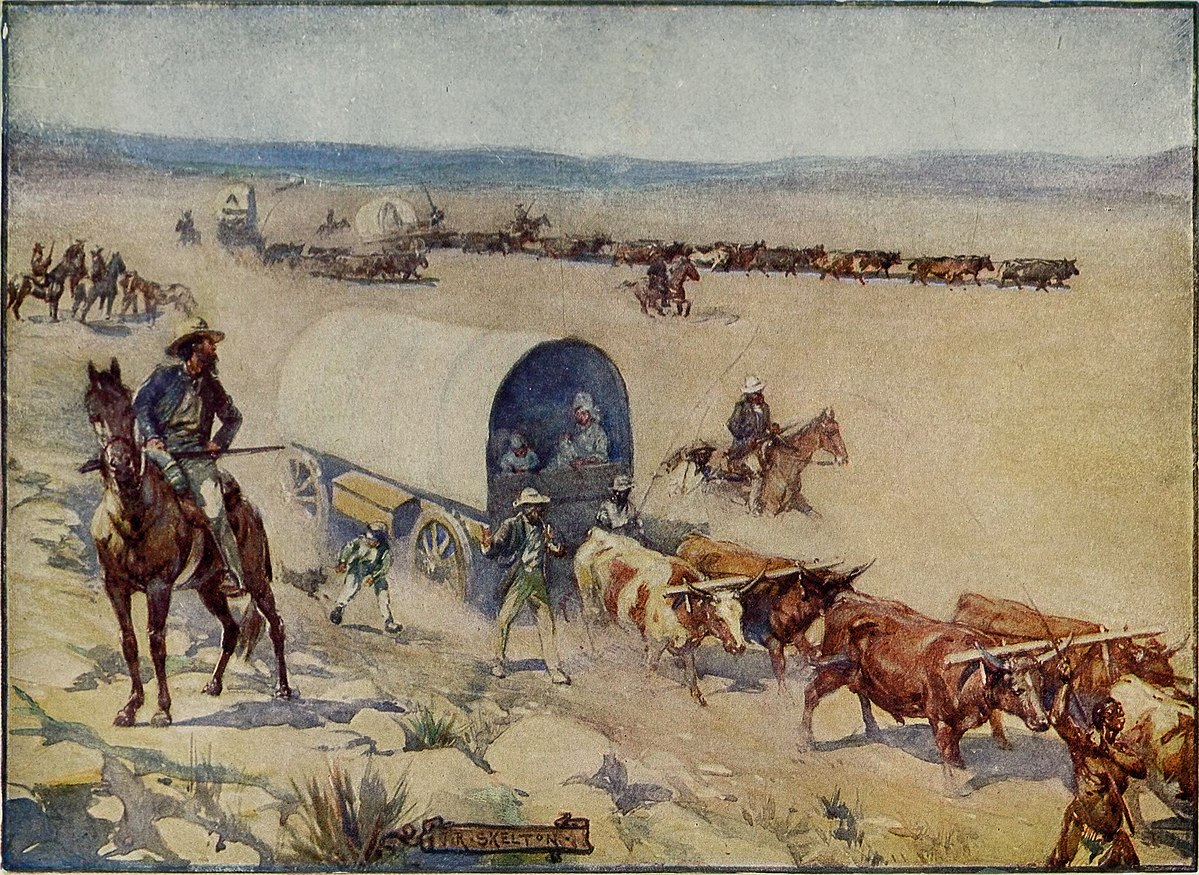_-_The_Voortrekkers.jpg)
Depiction of the Voortrekkers in South Africa
Black people living in the Transvaal, also known as the South African Republic, were required to carry passes. This Boer Republic was established in September 1853, and had a rapidly growing population of both Black and White South Africans. The two groups lived in close proximity to one another and this led to conflict over hunting and grazing rights. In 1866 pass laws was passed, restricting the movement of Black people to certain areas only, anyone found without a pass could be arrested.
Passes were also made use of on the diamond and gold mines of South Africa. On the diamond mines blacks were forced to carry passes at all times and on the gold mines laws were passed that prohibited Black, Coloured and Indian South Africans from living or working on a mine except as a slave to a White man. On the gold mines pass laws was enforced to keep Black people within designated areas and also prohibited their families from visiting them.
The Union of South Africa, established 31 May 1910, made up of the British colonies of the Cape Natal, Orange Free State and Transvaal under the leadership of Louis Botha. The end of colonialism did not improve the lives of Black South Africans and they retained their inferior status under this new government.
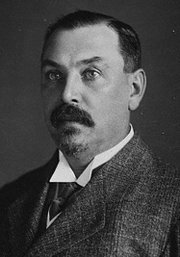
Louis Botha
Some of the new discriminatory laws passed included the 1911 Mines and Works Act and the Native Land Regulation Act of the same year. These acts specifically targeted the labour sector, it reserved certain skilled positions for Whites. Blacks would receive less compensation if injured in industrial accidents and would also be held criminally responsible for any breaches in work contracts.
During this period pass laws remained in place and in May 1918, Black workers embarked on a strike against the oppressive laws. The Bantu Women’s League also held an anti-Pass campaign during this same period.
Pass Laws under Apartheid
The Reunited National Party, under D.F Malan won the 1948 national general elections, ushering in the era of apartheid. Under the backdrop of Afrikaner Nationalism, Malan was determined to implement the policy of separate development.
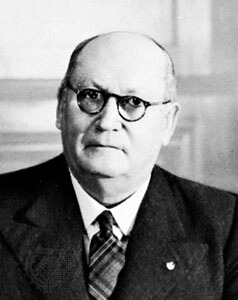
D.F Malan
Some of the acts passed by Malan included the Prohibition of Mixed Marriages Act of 1949, the Immorality Act of 1950 and also the Population Registration Act. The Population Registration Act established a national registration process which classified people according to their race. In 1953 the Separate Amenities Act was passed and completed the separation of people in South Africa according to their race. Another law passed during this period was the Natives Act of 1952 which forced Black South Africans to carry a range of documents incuding, place of birth, a photograph, employment records, tax payments and criminal records. The Natives Act further enabled the government to restrict the movement of Black South Africans.
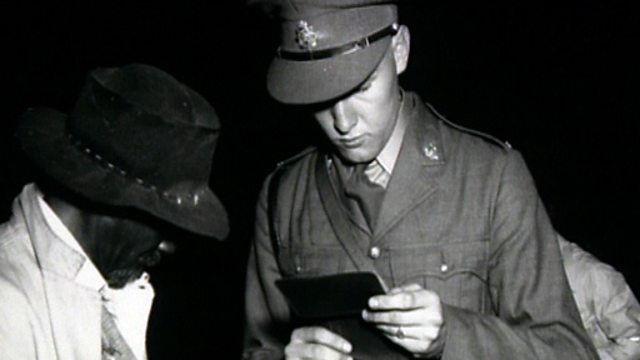
Policeman checking the pass of a Black South African
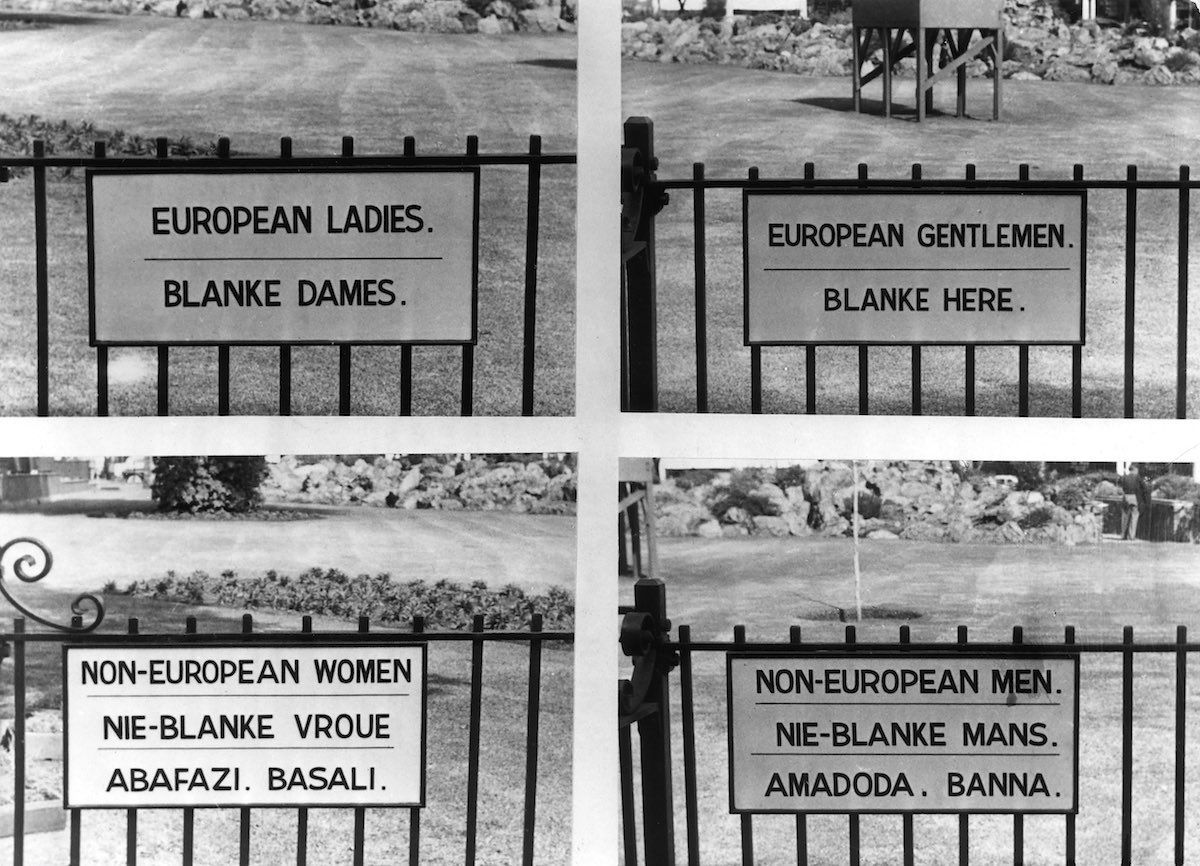
Signs used during apartheid
Resistance to Pass Laws
During the 1900s, there were many campaigns against pass laws which largely went ignored. One of the campaigns was the historic women's march to the Union Buildings in Pretoria. The march which took place on 9 August 1956, was attended by more than 20 000 women of all races.
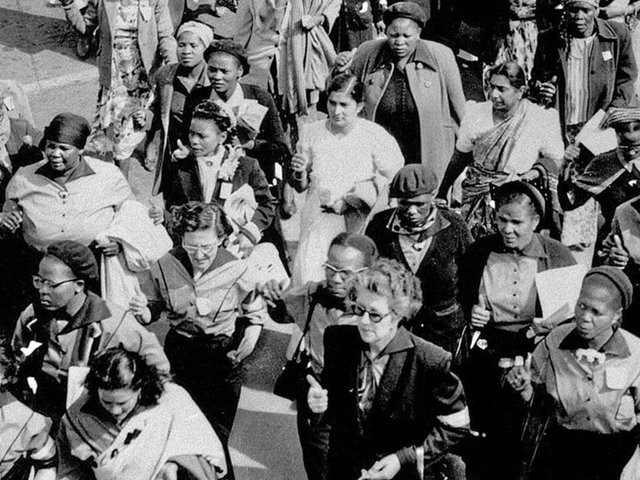 Women marching to the Union Buildings, August 1956
Women marching to the Union Buildings, August 1956On the 16th December 1959 the ANC ( African National Congress) declared 1960 was going to be the 'Year of the Pass'. Another anti-apartheid movement the PAC (Pan Africanist Congress), a breakaway group from the ANC, also announced their own anti-pass campaign. Both the ANC and the PAC campaigned feverishly nationwide to prepare their members and Black communities in general to prepare for the proposed campaigns.
Sharpeville Massacre

Robert Sobukwe, former leader of the PAC
PAC President Robert Sobukwe announced at a press conference held on the 19th March 1960, that the PAC was going to embark on an anti-pass campaign on Monday the 21st of March. Members of the PAC walked around Sharpeville waking people up, urging them to take part in the demonstration on the morning of 21 March. PAC members also tried to stop bus drivers from going on duty, which resulted in a lack of transport for people going to work, many set out for work on foot or on bicycles. While most joined the demonstration quite willingly, some were intimidated by PAC members.
PAC leaders, on the morning of 21 March, first gathered on a field not far from the Sharpeville police station. When a large enough crowd of people had joined them, they made their way to the Sharpeville police station, chanting freedom songs and slogans. When they arrived at the police station, a heavy contingent of policemen were waiting for them outside. PAC leaders continued to advance and asked the policeman in command to let them through, so that they could hand themselves in for refusing to carry passes. The police commander refused, but much later allowed them through.
As the day went on, the chanting of freedom slogans and songs continued with even greater volume. By mid-day there were about 300 policeman facing a crowd of about 5000 people. A policeman was accidentally pushed over, when a small scuffle began near the entrance of the police station and the crowd moved forward to see what was happening. The police claimed that people began to stone them and without warning, a policeman on top of one of the armoured police cars opened fire. The other policemen also started shooting at the crowd, the shooting lasted about 2 minutes, leaving 69 people dead and 180 people seriously injured.
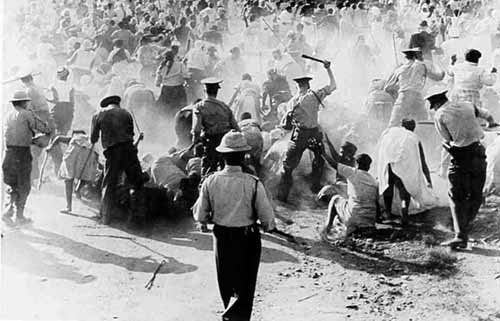
Police beating protesters during Sharpeville massacre
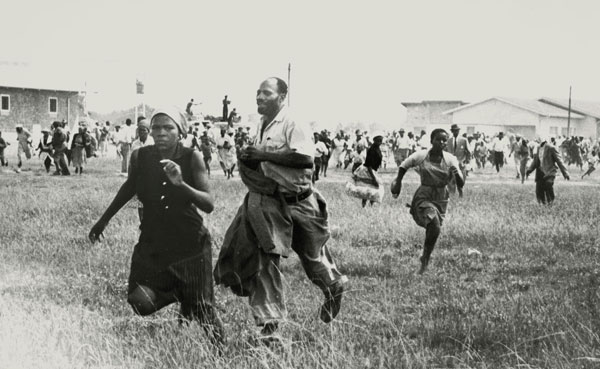
People fleeing the scene of the Sharpeville massacre
According to eye winesses, police had given no warning for the crowd to disperse. A large number of people were shot in the back as they were fleeing, eye witness accounts and evidence later led to an official inquiry.
Humphrey Tyler, the assistant editor at Drum magazine, who was present at the Sharpeville police station described what he saw...
The police have claimed they were in desperate danger because the crowd was stoning them. Yet only three policemen were reported to have been hit by stones - and more than 200 Africans were shot down. The police also have said that the crowd was armed with 'ferocious weapons', which littered the compound after they fled.
I saw no weapons, although I looked very carefully, and afterwards studied the photographs of the death scene. While I was there I saw only shoes, hats and a few bicycles left among the bodies. The crowd gave me no reason to feel scared, though I moved among them without any distinguishing mark to protect me, quite obvious with my white skin. I think the police were scared though, and I think the crowd knew it.
Source
The 21st of March is Human Rights Day in South Africa, in commemoration of the Sharpeville massacre.
Source - Pass laws in South Africa
Source - Women's march
Source - Sharpeville massacre


Team South Africa banner created by @bearone
I have always said that regardless of our cultures or nationalities is important to know the history, the past, to know where we come from and not make the same mistakes again, I congratulate your article I found it very interesting and enrriquecedor, I invite you to visit my blog , regards!!
Thanks for taking the time to read my article :-)
Congratulations! This post has been upvoted from the communal account, @minnowsupport, by hoosain from the Minnow Support Project. It's a witness project run by aggroed, ausbitbank, teamsteem, theprophet0, someguy123, neoxian, followbtcnews, and netuoso. The goal is to help Steemit grow by supporting Minnows. Please find us at the Peace, Abundance, and Liberty Network (PALnet) Discord Channel. It's a completely public and open space to all members of the Steemit community who voluntarily choose to be there.
If you would like to delegate to the Minnow Support Project you can do so by clicking on the following links: 50SP, 100SP, 250SP, 500SP, 1000SP, 5000SP.
Be sure to leave at least 50SP undelegated on your account.
Your Post Has Been Featured on @Resteemable!
Feature any Steemit post using resteemit.com!
How It Works:
1. Take Any Steemit URL
2. Erase
https://3. Type
reGet Featured Instantly & Featured Posts are voted every 2.4hrs
Join the Curation Team Here | Vote Resteemable for Witness
Not one of history's more shining moments- or periods, for that matter. Colonialism screwed Africa hard.
Congratulations! Your post has been selected as a daily Steemit truffle! It is listed on rank 11 of all contributions awarded today. You can find the TOP DAILY TRUFFLE PICKS HERE.
I upvoted your contribution because to my mind your post is at least 16 SBD worth and should receive 65 votes. It's now up to the lovely Steemit community to make this come true.
I am
TrufflePig, an Artificial Intelligence Bot that helps minnows and content curators using Machine Learning. If you are curious how I select content, you can find an explanation here!Have a nice day and sincerely yours,

TrufflePigCongratulations! This post has been chosen as one of the daily Whistle Stops for The STEEM Engine!
You can see your post's place along the track here: The Daily Whistle Stops, Issue # 84 (3/25/18)
The STEEM Engine is an initiative dedicated to promoting meaningful engagement across Steemit. Find out more about us and join us today!
Thank you :-)
These events are still so shocking, even more so because they happened well within living memory. It's one reason why I am against a national ID card. People forget so quickly what these things can mean. Thanks for the very lucid reminder.